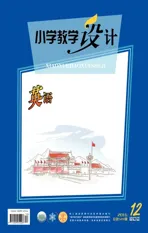修订版PEP 六(上)Unit 3 My weekend plan B Read and write
2016-03-01单静
单 静
Step 1.Pre-reading
1.Free talk.
T:How are youtoday?How are you at school every day?
Ss:We’re happy at school.
T: That’s great. The students in my school are happy at school too.Let’s enjoy some pictures of them.What do they do?(呈现一组学生在复活节时活动的照片)
Ss:They have Easter.They show their Easter eggs.
T:Look!They dress like witches.What holiday is it?
Ss:It’s Halloween.They are making jack-o’-lanterns.
T: How about these pictures?What are they doing?What holiday is it?Do you have this holiday at school?What are you going to do?Are you going to...?
Ss:...
【分析】因为是借班上课,学生对当天来上课的教师不熟悉,教师选择他们同龄学生的活动照片,就是想激发起他们反观自己学习和生活经历的意识,这样就可以顺理成章地与学生拉近距离,在语言输出方面,也逐渐将主动权交给学生,由教师带着说,到提供语言支架,再到让学生根据节日信息自主完整回答问题。同时为接下来引出本课教学主题做好充分的语言准备。
2.Elicit the topic.
(1)Talk about our favorite holiday.(略)
(2)Read and guess.
T:Yes,summer holiday is fun.Please read and guess what my favourite holiday is.(采用逐行呈现内容的方式,给学生更多猜测的空间,激发他们的发散型思维)
Ss:Is it Christmas?
T: No, please keep reading.
Ss:Is it Spring Festival?
T:That’s correct.
【分析】在与学生互动式的交流中,了解到他们最喜爱的节假日,并且也无痕地渗透了一些新知,为接下去阅读中的活动奠定了语言基础。
T:What do we usually do at Spring Festival?What are we going to do next year?
Ss:You usually...You are going to get together and you are going to take a trip.(问题有些难,学生在教师的帮助下在短文中找到关键信息,正确回答)
3.Show the topic.
T:Yes,this is my family’s holiday plan.
(教师在先前的Holiday之后,再补充上Plan,完整呈现当天的教学主题:Holiday Plan)
【分析】本单元的主题是Weekend Plan,所以学生对Plan的意思很熟悉。当教师出示Holiday Plan这个主题时,学生们会对当天的语言重点与学习任务心领神会,他们的心理准备、语言联想、行为活动都会有意识地朝向这个主题。
Step 2.While-reading
1.Present the diary.
(1)Lead in the festival in the diary.
T:What festival does Wu Yifan write about in the passage?
Ss: It’s Mid-Autumn Festival.
T:When isitin the passage?
Ss: Tomorrow is Mid-Autumn Festival.
【分析】Festival一词由阅读前的渗透,再到阅读中的呈现,学生已经在语境中自然习得。
(2)Introduce the format of diary.
T: What type is the passage?Please have a look at some others.(教师圈出可以判断这篇文章体裁的信息,并且给出同一类型体裁的文章帮助学生判断)
S1:Oh,it’s a diary.(允许学生用中文表达)
T:Yes,it’s a diary.It’s Wu Yifan’s diary.(教师给出英文,并且带领学生理解与认读,关注ia的发音,板书diary,标出重音)
【分析】运用关键信息让学生自主发现文章体裁的方式,既可以培养学生的观察能力,也可以培养学生分析和运用信息的能力,学习策略的培养应该贯穿在平时的教学中。
2. Read quickly and answer.
T:Read the diary quickly and answer:WhatareWu Yifan’s family going to do?
Ss:学生快速阅读,找到关键内容。
S1:They are going to get together and have a big dinner.
(“get together”在阅读前的活动中已经渗透,这里需要强调together的发音及其重音,并板书tomorrow,要求学生根据发音情况标出重音)
【分析】学生带着问题第一次默读日记,这个问题不难,既与当天的教学主题相关,又要用到本单元重要的语言知识。过程中,全班学生几乎都可以在快速阅读后给出正确答案,这也为学生接下去阅读学习增强了信心。
T:Yes,they are going to get together. They will get together.
(教师在PPT中将两句话一一呈现,让学生自己感知两句话的意思相同,一般将来时态可以使用这两种方式表达。接着教师再次板书,让学生看着黑板自己读一读)
【分析】在热身阶段的师生互动中,学生已经感知了will这个结构,此时的呈现,可以让学生自己在回忆中建立初步的联系。同时,教师的不解释实际上也是为课堂留白,让学生通过自己的主动学习去填补信息沟。
3.Read and fill in the table.
T:Please read the diary again and fill in the table.
Ss:学生在中秋节主题背景音乐的环境中完成表格填写。
T:What is Wu Yifan’s aunt going to do?
S1:She is going to make mooncakes.
T:We also can say she will...(引导学生补充完整)
Ss: She will make mooncakes.( 板 书 mooncake,标注重音,让学生认读)
T:Who can ask?(引导学生提问)
S2:What is Wu Yifan’s grandma going to do?
T:What will Wu Yifan’s grandma do?(教师采用另一种表达方式重复问题)
S3:She will tell us a story about Chang’e.
S4:She is going to tell us a story about Chang’e.
T:Great.Next question,please.
S5:What are Wu Yifan and Robin going to do?
T:What will Wu Yifan and Robin do?(教师呈现两种提问方式的板书)
S6:They are going to read a poem.(板书poem,标注重音,让学生认读)
S7:They will read a poem.
教师将两种回答方式全部呈现在PPT的表格中,学生再次对比、感知两种表达方式。
【分析】学生第二次默读日记,较之第一次而言,任务难度提高,由直接口头回答,到完整书写;关注点多了,既要关注人称的变化,又要清楚两种表达方式的变化。此时教师的任务就是为学生提供必要的帮助,同时更要调动学生学习的积极性和主动性。从be going to和will回答时的相互替换,再到提问时的相互转换。难度虽然在提高,但学生都是在主动找寻方法、找寻规律,自主提问和回答。小学阶段虽然不强调语法,但我们也不回避语法,用正确的方式让学生自主探究,用主动实践掌握语法规律。
4.Retell the diary.
T: Tomorrow is Mid-Autumn Festival.Please look at the table and retell Wu Yifan’s diary.
Ss:学生自主选择be going to或will进行日记的复述。
【分析】复述日记的过程实际上就是运用be going to或will结构进行语言表达的过程,从阅读前教师的引出,让学生在语境中感知,到阅读日记完成表格的填写,再到反馈表格内容的实践,直至此时的运用,学生们完成了对一般将来时态will结构的自主学习过程。
5.Read the poem.
(1)Lead in the poem.
S1:...Wu Yifan and Robin will read a poem.
T:What poem will they read?Please look and listen.(在PPT中呈现整首小诗,学生边看边听)
T: Can you find out something special from the poem?(如果学生发现不了,教师可以将每句话已圈出的首字母呈现出来)What letters are they?
Ss:F-A-M-I-L-Y,family.
T:Yes,we always have a holiday with our family.(在PPT中呈现出这句话)
【分析】小诗的呈现水到渠成,但是小诗的情感体验与意思理解却有一定的难度。节假日的庆祝离不开家庭的氛围,family既是小诗内涵和情感的核心,又是整节课的情感基础,从这里将得以逐步升华。
(2)Feel the atmosphere of different festivals.
T: Let’s enjoy some pictures about different festivals.What do you do with your family?
Ss:We get together and watch the moon on Mid-Autumn Festival.
Ss:We get together and have a big dinner on Spring Festival Eve.
Ss:We get together and have a big dinner on Christmas Eve.
【分析】轻松的背景音乐中,节日里全家其乐融融的图片鱼贯而出,学生们根据图片提供的信息进行语言输出,并且在听、看、说不同感官的调动下,加深了对节日之中family的体验与理解。
(3)Read outthepoem aloud.
①Listen and pay attention to the pronunciation and intonation.
②Listen and imitate in a low voice.
③Read by themselves.
④ Read out aloud individually.(学生的反馈朗读是配乐诗朗诵)
【分析】在情感的层层铺垫中,学生所学知识得以自主内化,再辅以充足的时间练习,其朗读能力一定会提高。在轻松优美的背景音乐中,学生的朗读内容也得以美化,从而更强化了他们的自信心。
Step 3.Post-reading
1.Talk about the holiday plan.
T:Wow,Wu Yifan has a great holiday plan.His family will be very happy.How about yours?
S1:I am going to have Christmas with my family.
S2:Iwillhave Spring Festival with my family.
S3:...
T:What are you going to?Who are you going to have this holiday?Please take out the table of the holiday plans and talk about it with your partner.
学生拿出Holiday Plan的信息表格,两两讨论、交流,说一说自己的节日计划。
2.Choose and write.
T:Wu Yifan wrote a diary about his holiday plan.Please write a diary about your own holiday plan.
Dear Diary,
______is going to be on/in______.
I’m going to ______.
______.
We will have a good time.I love ______.
T:What message do we need for your diary?
Ss:Today is...It’s cloudy today.(教师给出一个范例,再由学生自主完成自己的日记,完成后进行现场反馈,关注学生书写的合理性与正确性)
【分析】回顾阅读后的流程,首先要求学生们自由说一说自己的节日计划,然后再根据表格提供的信息两两交流,这时表格的信息既是补充也是帮助,从刚才与教师单向交流的一两句话,过渡到生生互动的一段话,语言量如滚雪球般越来越大。本节课也实现了说、写两种形式的语言输出。
Step 4.Homework(略)
